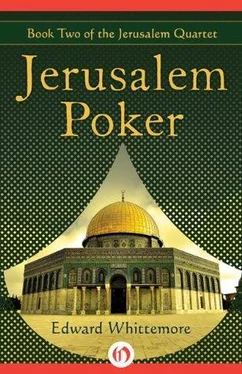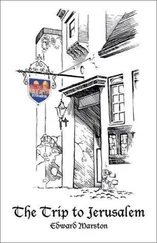But for Nubar the largest collection of Paracelsus wasn't enough. While growing up in the ancestral Wallenstein castle in Albania, Nubar had early fallen victim to those traditional suspicions and rampant fears that had plagued the first Wallenstein master of the castle in the seventeenth century, and thereafter all the Skanderbeg Wallensteins save for the last, Nubar's grandfather, a fanatical renegade Trappist monk who had discovered an ancient manuscript in the Sinai that was in fact the oldest Bible in the world. His horrified grandfather had found that Bible untenable in every respect, denying every religious truth ever held by anyone, and out of piety had proceeded to forge an acceptable original that could provide grounds for faith.
Parabastus Hohencelsus von Bombheim.
Fear in the case of the first Albanian Wallenstein that the enemies of his murdered uncle, the once all-powerful Generalissimo of the Holy Roman Empire, were sending out spies to kill him.
Suspicion in the case of subsequent Skanderbegs, those illiterate warriors who had spent their lives away from the castle fighting in any army that would have them, because they were incapable of combining love with sensual pleasure and were therefore impotent with their wives, able to be aroused sexually only by very young girls of eight or nine.
Suspicion feeding on itself and eventually giving birth to its own reality as successive Skanderbegs, who when young had always sensed that their fathers were strangers, grew up and came to know for a fact that their own sons were fathered by strangers, a terrible burden of isolation causing lifelong instability, the sons fatherless and the fathers sonless generation after generation in the family's dark dank castle perched gloomily on a wild Albanian crag, a windy and insecure Balkan outpost in the precarious marches separating Christian Europe from the Moslem realm of the Turks.
Hohenbomb von Celsus Paraheim.
Excessive doubts and traditional fears harrying Nubar as they had harried Wallenstein men for centuries, those unrelated and suspicious warriors who had violently distrusted everyone at home while imagining extravagant plots against them abroad. Vague yet pervasive plots that explained all events on earth. The entire universe, as they saw it, secretly arrayed against these insignificant masters of a remote Albanian castle.
And so too Nubar, even though his grandmother, Sophia, still ran the castle as she had for the last seventy-five years, ever since her common-law husband, Nubar's grandfather, had returned home from his stupendous labors in the Holy Land, broken and insane. Nubar sensed those same plots from the past and he could no more control his fear of them than keep his left eyelid from drooping when he was excited, another affliction of the first Wallenstein master of the castle that had subsequently been visited upon all Wallenstein males.
Inexplicably so. For since none of the Wallenstein males had been related prior to the time of Nubar's grandfather, how could they possibly share such specific characteristics?
The question had never been answered, and with good reason. Because to do so would have been to admit acausal relationships in the Balkans, influences removed from logic which would have been highly confusing in their disorderly ramifications, and had therefore always been thoughtfully ignored as nonexistent.
Hohenbastus von Heim Parabomb.
Or in short, Paracelsus, the master alchemist of all time.
Briefly professor of medicine at the University of Basle early in the sixteenth century. Forced to leave because of his defiance of tradition, which took the form of explaining things that had never been explained, relating things that had never been related, and conversely, unrelating other things that had always been seen as tightly wedded. In general, then, wreaking havoc throughout the entire shadowy terrain that lay between cause and effect.
Brilliant and eccentric and quarrelsome, renaming himself Paracelsus because he felt the name he had been born with was insufficient for his needs. Prodigiously learned, vitriolic in debate and psychotically self-confident, believer in the four Greek elements of earth and air and fire and water, and the three Arab principles, mercury and salt and sulphur. Discoverer of the philosopher's stone which would allow him to live forever. Successively a profound scholar, a miner, a mixer of metals in dim cellar laboratories, a dreaming wanderer, a political radical, a barefoot Christian mystic.
And finally the magus himself, Faust, first modern scientist of the soul. The genius who first used minerals to treat internal diseases, who scorned remedies such as bloodletting and purging and sweating.
Unswerving advocate of opium and mercury compounds in search of the spirit.
Celsusheim Parahohen von Bomb.
Nubar hadn't been satisfied to have the largest collection of the magus's works, he had to have all of them. Because if he didn't it meant that someone, somewhere, would have the power to plot against him, to use an unknown page of the master alchemist's conjectural knowledge to harm him.
Once more Sophia had indulged him, this time providing him with unlimited funds to hire full-time literary agents whose job, as Nubar innocently explained it, would be to track down the lesser known works of Paracelsus and buy them.
Admirable, thought Sophia. For a boy in his sixteenth year, he's already displaying his grandfather's scholarly bent to a remarkable degree.
But in fact Nubar wasn't scholarly at all. His bent was elsewhere and his network of literary agents had soon expanded into a private intelligence service with its own complete hierarchy of control centers and agents and informers, nothing less than a vast criminal organization operating throughout the Balkans, its scheming employees chosen by Nubar solely for their abilities in intrigue and intimidation, burglary and embezzlement.
This had been necessary because the works Nubar now sought were either so rare or so treasured by their owners no amount of money could buy them. They could only be extorted from their owners, or failing that, stolen.
Thus for the last six years, since the closing days of 1921, Nubar had been regularly receiving secret reports in his Albanian headquarters, the tower room of the ancestral Wallenstein castle. These reports he studied suspiciously before issuing the daily directives to his agents that would eventually lead to another illegal acquisition, by blackmail or bludgeoning, from a monastery in Macedonia or a book-dealer in Bulgaria, or perhaps from a private library in Transylvania.
Celsus Heimbomb von Bastus.
When Nubar had founded his criminal organization in 1921, he had decided to name it the Uranist Intelligence Agency, because it pleased him to associate himself with the Greek sky-god Uranus, the personification of heaven and the first ruler of the universe, and the father as well of those deformed creatures of old, the cyclops and the furies.
Hulking mindless shepherds with their single round eyes fixated on the hindquarters of retreating sheep?
Frenzied raving women so grotesque they had snakes for hair?
Yes, the images pleased Nubar. Their implications were close to his heart, and thus he had chosen Uranus for the name of his secret network.
And also because he knew that if any planet guided his destiny it would have to be Uranus, remote and mysterious, its true nature unknown, its astrological sign a variation of the male symbol, twisted, punctuated with a black hole.
Paraho von Bomb von Heim. Eternal Bombastus.
Since the agents of the UIA came from the most disreputable elements in the Balkans, it was inevitable they couldn't all be professional criminals. Naturally there were also clever charlatans lurking in the ranks, along with the outright quacks and impostors, unctuous fabricators whose only talents lay in inventing ever more intricate and fantastic schemes for squandering Nubar's money.
Читать дальше












